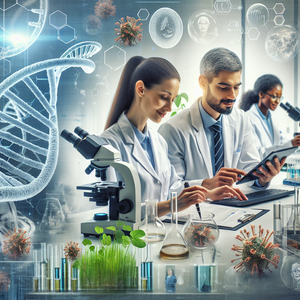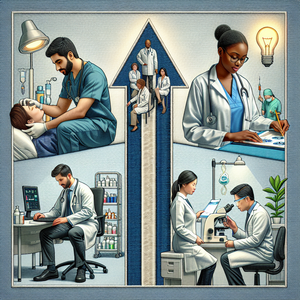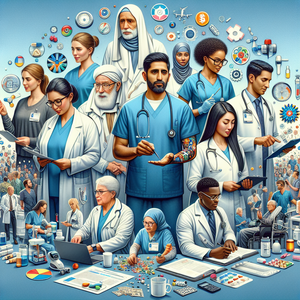
Exploring the Top 10 In-Demand Careers in Biotechnology: Comprehensive Job Overviews and Future Opportunities
The biotechnology sector is on an impressive growth trajectory, creating a plethora of career opportunities that seamlessly blend science, technology, and innovation. With breakthroughs in medical and agricultural biotechnology, the need for qualified professionals has surged. Roles such as biomedical engineers and biochemists are critical in developing novel therapies and improving agricultural efficiency. This article delves into a variety of biotechnology careers, detailing job responsibilities, educational prerequisites, and their significance within the industry landscape.
Job Summaries:
Biomedical Engineer:
- Innovate and create medical devices and equipment.
- Key Responsibilities: Conduct research, collaborate with healthcare providers, ensure compliance with regulations.
- Educational Background: Bachelor’s degree in biomedical engineering; strong analytical abilities.
- Industry Impact: Pivotal in advancing medical technologies, thereby enhancing patient care outcomes.
Biochemist:
- Investigate biological processes at the molecular level.
- Key Responsibilities: Conduct experiments, analyze findings, develop new pharmaceuticals or treatments.
- Educational Background: Ph.D. in biochemistry or a related discipline; proficiency in laboratory techniques.
- Industry Impact: Central to drug discovery and therapeutic advancements, playing a significant role in improving human health.
Clinical Research Associate (CRA):
- Oversee clinical trials for emerging drugs.
- Key Responsibilities: Monitor trial sites, ensure regulatory compliance, analyze data for reporting.
- Educational Background: Bachelor’s degree in life sciences; prior experience in clinical research preferred.
- Industry Impact: Ensures ethical trial conduct, facilitating the development of innovative therapies.
Microbiologist:
- Examine microorganisms and their interactions.
- Conduct research to identify new antibiotics and vaccines.
- Bachelor’s degree in microbiology; laboratory experience.
- Essential for public health initiatives, food safety, and environmental conservation.
Biotechnology Regulatory Affairs Specialist:
- Ensure product compliance with regulatory standards.
- Key Responsibilities: Prepare regulatory documentation, liaise with governing agencies, provide compliance advice.
- Educational Background: Degree in life sciences; familiarity with regulatory frameworks.
- Industry Impact: Integral for the safe and effective market introduction of new biotechnological products.
Biomanufacturing Technician:
- Operate and maintain equipment for biological product production.
- Oversee production processes.
- Ensure quality control measures are met.
- Background in biotechnology.
- Technical proficiency in equipment operation.
- Vital in scaling production to meet healthcare demands efficiently.
Genetic Counselor:
- Evaluate risk factors for inherited conditions.
- Offer insights on genetic testing options and their implications.
- Master’s degree in genetic counseling; excellent communication skills.
- Growing importance as genetic testing becomes more commonplace in healthcare settings.
Bioinformatics Specialist:
- Analyze and interpret complex biological data.
- Key Responsibilities: Utilize software for genetic data interpretation, develop computational tools.
- Educational Background: Degree in bioinformatics or related field; programming expertise.
- Industry Impact: Crucial in the evolution of personalized medicine and genomic research.
Quality Control Analyst:
- Test and analyze biotechnology products for compliance with standards.
- Conduct experiments, evaluate results, document findings.
- Degree in biology or chemistry; keen attention to detail.
- Ensures high-quality standards for biotechnology products, safeguarding public health.
Research Scientist:
- Conduct investigations to further biotechnological knowledge.
- Key Responsibilities: Publish research findings, collaborate on projects, secure funding.
- Educational Background: Ph.D. in a relevant area; robust research capabilities.
- Industry Impact: Fundamental to the progress of biotechnological discoveries and innovations.
The biotechnology sector stands out as an exciting field filled with diverse career opportunities for those passionate about science and technology. With a robust job market and various roles available, professionals in this industry are instrumental in shaping the future of health, agriculture, and environmental sustainability. For individuals contemplating a career in biotechnology, it is vital to explore the many job titles and pathways accessible. To embark on your biotechnology journey, consider leveraging specialized job search platforms that cater to this dynamic industry. By familiarizing yourself with the roles outlined above and understanding the necessary skills for each, aspiring professionals can make informed choices in a field poised to lead future innovations and societal impacts. Through engagement with current events and trends, and by connecting with industry professionals, you can cultivate a deeper understanding of the vibrant world of biotechnology.
Explore More Jobs

